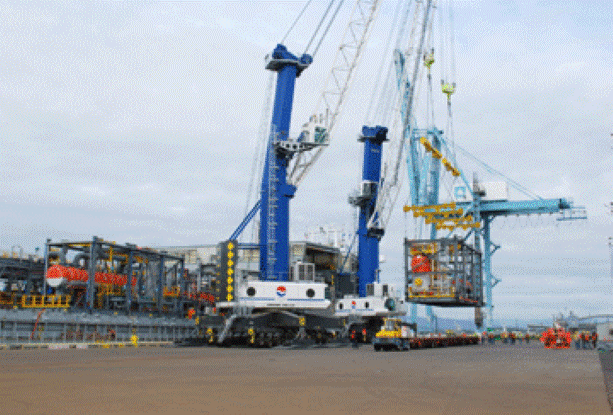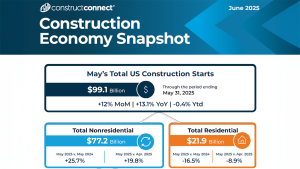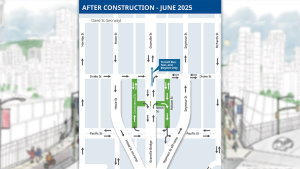The first shipment of South Korean-made modules for Imperial’s $8-billion Kearl oilsands project arrived in Washington State and are on their way to the construction site near Fort McMurray, Alta.
The first shipment of South Korean-made modules for Imperial’s $8-billion Kearl oilsands project arrived in Washington state and are on their way to the construction site near Fort McMurray, Alta.
However, the massive modules are being stored in Lewiston, Idaho until road transportation permits are issued.
“The first two barges arrived at Lewiston on Oct. 14 and there are two more barges en route,” said Imperial spokesman Pius Rolheiser.
They are expected to reach Lewiston this week.
“The plan is to transport 40 modules in total before the closure of the locks on the inland water system of the Columbia and Snake rivers in December,” he said.
Rolheiser added that eight modules arrived by ship at the Port of Vancouver, Washington earlier this month.
The manufacturer, Sungjin Geotec Co., is responsible for the ocean transport and discharge of the modules.
At Vancouver, Imperial Oil and its construction contractor, Fluor Corp. handle the next leg of the delivery, which includes loading the modules onto barges for the 500 km trip up the Columbia and Snake Rivers to the Port of Lewiston.
“We are currently awaiting decisions from the department of transportation in both Montana and Idaho,” said Rolheiser.
“We can’t transport the modules past the Port of Lewiston without approval and permits from these states.”
The public consultation process in Montana for the environmental impact assessment of Imperial Oil’s Kearl Module Transport Project closed on May 14.
Imperial is waiting for the Montana Department of Transportation to complete the assessment and issue what is called a finding of no significant impact, which is required to transport the 207 modules.
Imperial is also waiting for the Idaho Transportation Department to issue permits for the movement of these loads.
According to Rolheiser, both states are waiting for an Idaho Supreme Court decision on an appeal filed by ConocoPhillips.
The company is planning to use some of the same routes as Imperial to move its own oversize loads across the region.
A lower court ruling in Idaho halted the shipment of several large coker drum units that were on their way to a refinery in Billings, Montana. These units have already been off-loaded from barges on the Snake river.
Residents of Idaho and Montana have criticized Imperial’s plan to transport oversized loads of prefabricated parts of oil extraction modules over U.S. Route 12, which is a scenic corridor along the narrow curving roads of the Clearwater and Lochsa Rivers.
During community meetings in Idaho, residents were concerned about a possible tip over of the 344,000 lb cargo into these rivers.
Critics of Imperial argue the risk of a tip over are even greater for the transport of the ConocoPhillips loads, that are also at the Port of Lewiston.
These shipments are wider and heavier than those planned by Imperial.
“The bottom line is we believe we can move these modules safely and with a minimum amount of impact,” said Rolheiser.
“Our transportation plans cover all aspects of moving these modules to minimize the risk of any incident. The plans are designed to make sure an incident doesn’t happen and includes an emergency response in case it does.”
Imperial is moving the first shipment of modules to Lewiston, before the Idaho Supreme Court has even made its decision on the shipments.
“We continue to work through the regulatory process with the Department of Transportation in Montana and Idaho,” said Rolheiser.
“We have confidence in the process and our ability to mitigate impacts.”
Despite the risks involved with this approach, Rolheiser was unsure how a failure to receive permits will impact the construction of the Kearl oilsands project.
“At this point, it is premature to talk about a delay in construction,” he said. “Construction at Kearl is 25 per cent complete and we are currently doing preliminary site work and excavation. We have not reached the stage of construction that involves these modules.”
If Imperial gets the permits, the modules at Lewiston will be mounted on giant trailers. They will move at night across the 134-miles of U.S. Highway 12 in Idaho and enter Montana at the 5,200 foot summit of Lolo Pass.
From Lolo Pass, the modules continue along routes 12 and 93 to Missoula, then eventually over Roger’s Pass in the Rockies, 5,600 feet above sea level.
The convoys will then continue through the U.S. arriving at the Canadian border crossing at Sweetgrass, Montana/Coutts Alta.
Once the units arrive at the Alberta border, they will make the 1,000 kilometre trip north to the Kearl oilsands construction site.











Recent Comments
comments for this post are closed